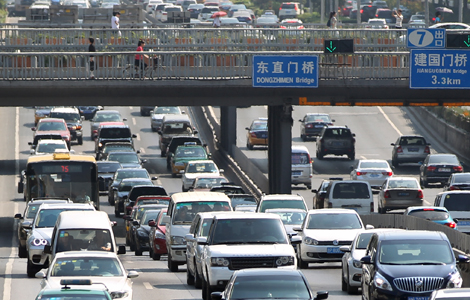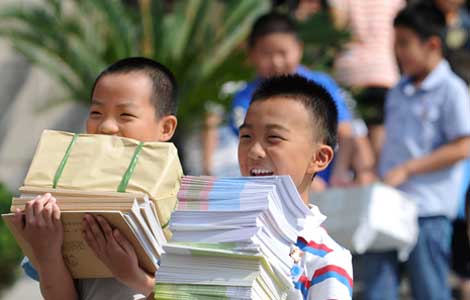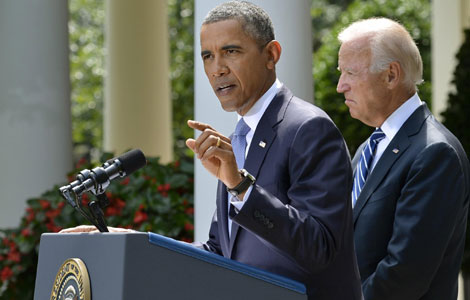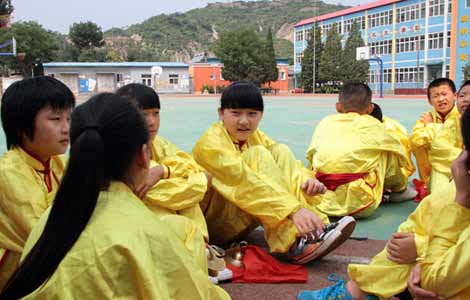Close ties with Central Asia USA
Updated: 2013-09-02 07:39
By Yao Peisheng (China Daily)
|
||||||||
President Xi Jinping's upcoming tour will further promote cooperation and boost relations between China and the region
President Xi Jinping's upcoming state visits to Turkmenistan, Kazakhstan, Uzbekistan and Kyrgyzstan from Sept 3 to 13 is another major diplomatic move by China's new leadership that has great significance.
First, the trip will help enhance mutual trust between China and the four Central Asian countries. Over the past 20-plus years since the establishment of diplomatic relations, China and Central Asian countries have been adhering to the principles of mutual respect, equality and mutual trust, mutual assistance and win-win cooperation. China firmly supports Central Asian countries choosing their own independent development paths and their efforts to maintain their sovereignty, territorial integrity and national security, and it has never interfered in their internal affairs for any reason or in any way. Meanwhile, Central Asian countries have always supported China's stance and policies on issues concerning its core interests. On major international issues, the two sides have exchanged information and coordinated their positions in a timely manner.
The established political mutual trust lays a solid foundation for the stable development of their relations. It can be said that China and the Central Asian countries have become good partners and friends in a genuine sense and their good-neighborly relations and cooperation have withstood the test of time. During his trip Xi will exchange in-depth views with the four heads of state on how to further boost bilateral relations. Without doubt, his tour will add new impetus to the building of political mutual trust.
Second, the trip will help deepen practical cooperation. Central Asia has unique geographic advantages. As early as 2,000 years ago, the ancient Silk Road connected China to the rest of the world via Central Asia. Over the years, China and Central Asian countries have been busy working on ways to create a modern equivalent to the Silk Road, including the accelerated upgrading of highways and the building of air transport facilities in the region, to expand practical cooperation in the real economy. The planned construction of the China-Kyrgyzstan-Uzbekistan railway will greatly shorten the distance between China and Europe, North Africa and the Middle East, and when it is completed Central Asia's geographic advantages will be brought fully into play.
With the acceleration of global economic integration, all participants will benefit from their closer cooperation. During the process of practical cooperation, China has been adhering to the principles of equality and mutual benefit. It is one-sided to argue that China only values Central Asia as a source of raw materials. Most Chinese enterprises investing in Central Asia are law-abiding State-owned enterprises, such as China National Petroleum Corporation, which make great efforts to facilitate local economic and social development and improve local people's livelihoods. In the context of the weak global economic recovery and the great untapped potential of Central Asian countries, China is willing to share its experience with its Central Asian neighbors and seek new cooperation opportunities.
Third, the trip will help safeguard regional peace and stability. Thanks to its special geopolitical importance, any changes in the situation in Central Asia will have a direct impact on the surrounding regions. Since the collapse of the Soviet Union, the overall situation in Central Asia has been controllable in spite of the threats of the three evil forces of separatism, extremism and terrorism. But the political unrest in North Africa and the Middle East and outside interference in the region has put pressure on Central Asian countries. Political turmoil in one country will mean trouble for the whole region. Therefore, it is imperative that China and Central Asian countries unite and coordinate their positions and establish regional security mechanisms to jointly address challenges and ensure national security. Especially, the ever-changing situation in Afghanistan needs more attention and communication from China and its Central Asian neighbors.
Since the 1990s, security cooperation between China and Central Asian countries has made great achievements and produced rich experience. A series of joint anti-terrorism military exercises held under the framework of the Shanghai Cooperation Organization has been a strong deterrence against the three evil forces. China, Russia and Central Asian countries have made great efforts to consolidate regional peace and stability.
During his Central Asian trip and attendance at the SCO summit, Xi will expound China's foreign policy toward Central Asia and will further exchange views and coordinate positions on regional and international security issues. To build a stable, peaceful and harmonious Central Asia is beneficial to regional prosperity and development, which is the common aspiration of all peoples in the region.
The author is the former ambassador of China to Kazakhstan.
(China Daily USA 09/02/2013 page11)
Most Viewed
Editor's Picks

|

|

|

|

|

|
Today's Top News
Top companies should adapt to slower growth
Chinese economy 'very strong' in long term
Sowing the seeds of sustained growth
Experts: US unwise to wage war on Assad
Visas for China get simplified
DPRK rescinds invite to US envoy
SASAC head target in graft probe
Eurasian nations focus on Net
US Weekly

|

|














